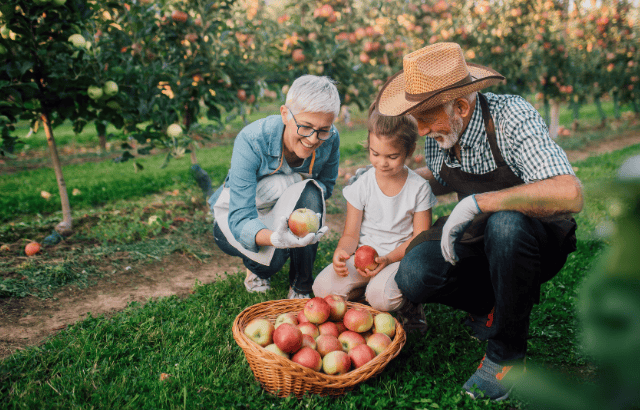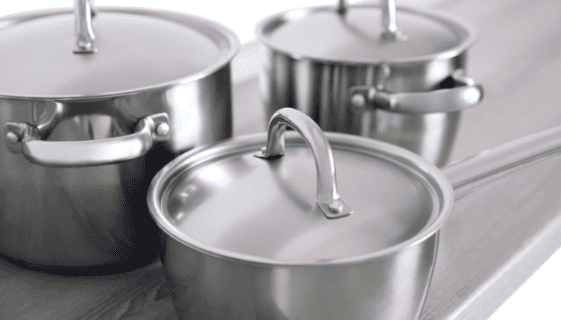As the air turns crisp and the leaves change colors, families around the world delight in what for many is a cherished fall tradition: apple picking. Whether you’re gathering apples at a local orchard or stocking up at the grocery store, this is the season to enjoy fresh apples in abundance.
However, apples are one of the most sprayed crops, and they often wind up on the Environmental Working Group’s (EWG) Dirty Dozen list. This annually updated list cites the fruits and vegetables that, according to the USDA, contain the highest amount of pesticide residues. Pesticides are commonly used in agriculture to protect crops from pests and diseases, but they can leave harmful residues behind.
In fact, over 90% of apples tested had pesticide residues on them. (In contrast, fruits like avocados and pineapples, which are on the Clean Fifteen list, are much less likely to have pesticide contamination.) Ideally, “Dirty Dozen” fruits and veggies would be purchased organically when possible, as organic certification prohibits the use of pesticides. (Please see our Tips for Enjoying Organic Foods on a Budget.)
However, since most apples on the market are conventionally grown (i.e., using pesticides), it’s important to know how to properly clean your apples to remove pesticide residue.
Fortunately, research shows that using a simple solution of baking soda and water can effectively wash away at least some pesticides from apples, ensuring that you and your family can enjoy this seasonal treat more safely.
Baking Soda + Water: The Best Way to Remove Pesticides from Apples
A study conducted by researchers at the University of Massachusetts, Amherst, and published in the Journal of Agricultural and Food Chemistry has revealed that soaking apples for 15 minutes with a solution of baking soda and water (see below for proportions) is the most effective way to remove two commonly used pesticides found on apple skin. (Baking soda, or sodium bicarbonate, breaks down pesticide molecules, making them easier to remove from the apple’s surface.)
While this process can significantly reduce the pesticide load on the apple’s surface, no washing method can completely remove pesticides that have penetrated deep into the fruit’s skin. However, peeling the apple means missing out on the nutritious benefits of the apple skin, which is rich in fiber, vitamins, and antioxidants.
How to Wash Apples with Baking Soda
It’s simple to use this method at home:
- Fill a large bowl or your kitchen sink with water and add about one teaspoon of baking soda for every two cups of water.
- Soak the apples in the solution for 15 minutes, ensuring that all surfaces are submerged. You can place a small plate or another light object on top of the apples to gently weigh them down and keep them fully submerged.
- Rinse the apples thoroughly under cold running water.
- Pat dry, and your apples are ready to eat!
This washing technique can be applied to other fruits and vegetables that appear on the EWG’s Dirty Dozen list as well.
RECIPE: Spiced and Stuffed Roasted Apples
Stay Safe This Fall Apple Season
Whether you’re picking apples in the orchard or grabbing them from your local store, a few extra steps in cleaning your apples can go a long way in protecting your health. Apple season is a time to enjoy this nutritious fruit with your family, and with a simple baking soda wash, you can feel confident you’re doing it safely.
At the Anticancer Lifestyle Program (ACLP), we are committed to helping you make informed choices about your diet and lifestyle to reduce cancer risks and improve overall wellness. Learn more about how to optimize your health and environment through our free resources and modules on diet, environment, mindset, and fitness.
FREE GUIDE: The Anticancer Grocery Shopping Guide
Ready to Learn More?
Check out the latest Dirty Dozen and Clean Fifteen lists from the Environmental Working Group for up-to-date information on which fruits and vegetables carry the highest and lowest pesticide residues. For more information on how to safely clean apples and other produce, you can also read the full study published in the Journal of Agricultural and Food Chemistry here.
By incorporating these small but important habits, you can confidently enjoy apple season knowing you’re supporting your health and embracing an anticancer lifestyle.
Happy apple picking!





